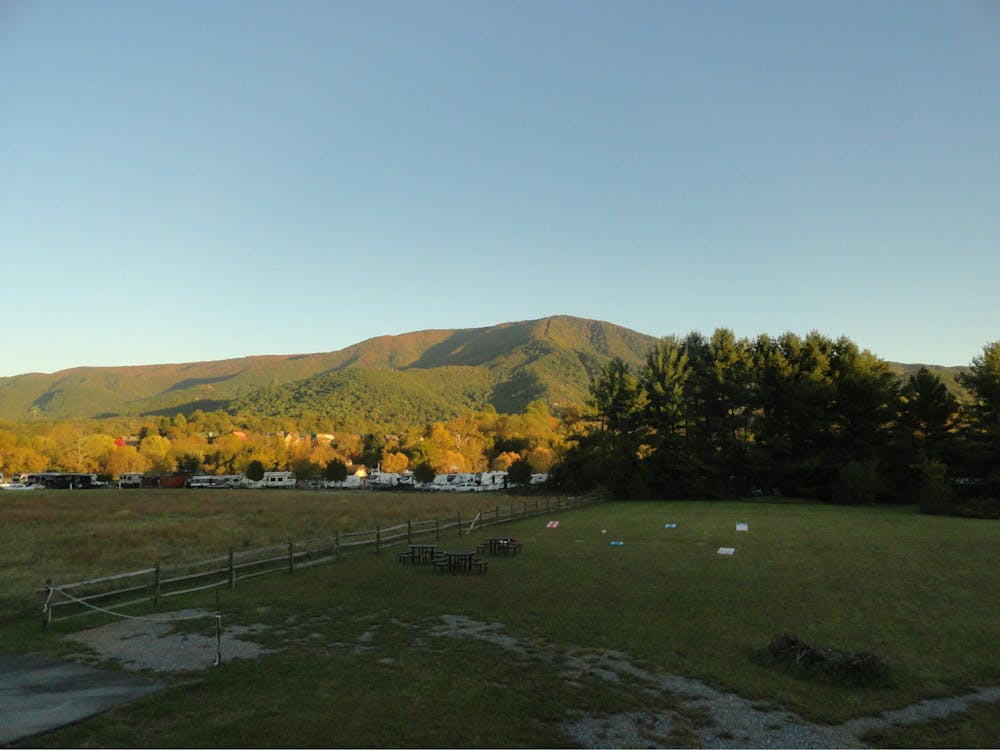How will a geographically polarized country vote tomorrow?
Pigeon Forge, Tennessee is a bizarre mix of old-timey, southern General Stores, gimmicky fried-food chains and bizarre amusement parks, all plopped down next to the most beautiful place on Earth. In late October, the trees dotting the Great Smoky Mountains were in full autumnal form. The crimsons, purples, burnt yellows and oranges of the leaves looked so scenic, I was almost convinced I was inside of a painting.
On our winding drives through Tennessee, my friends and I spotted not one, not two, but five Trump Superstores. What can you find at a Trump Superstore, you may ask? I think the better question would probably be: “What can’t you find at a Trump Superstore?” Among the dozens of collectibles are Trump can coolers, Trump rubber ducks, custom Joe Biden toilet paper, “M.I.L.F.” hats (“Man I Love Firearms”), Trump socks (with fuzzy orange hair attached) and the newly released, American-made “I’m voting FELON 2024” t-shirt.
In the Smoky Mountains, I found myself unable to imagine a future in which Trump would not win the election. The sheer volume and magnitude of Trump’s presence surrounding us was impossible to ignore. In Gatlinburg, two women window shopping next to me toted “Sleepy Joe” hats. In Nashville, a man ordering Prince’s Hot Chicken sported a t-shirt depicting Trump holding up both middle fingers — the caption “YOU MISSED” stamped just below.
My friends and I departed from Tennessee on Saturday, after five days in the Smokies and three nights in Nashville (as is tradition for Notre Dame seniors). Our heads were still cloudy from moonshine and overpriced cocktails. We drove back through quiet Kentucky, blooming with a kaleidoscope of colors, the fall foliage the most beautiful of backdrops. We listened to Fleet Foxes, John Denver and the Charlie Brown soundtrack.
To break up the drive, we stopped halfway in Cincinnati, whose hilly neighborhoods were crammed with houses all dressed up for Halloween, and whose yards were littered with a multitudinous number of signs. These signs either read “Kamala/Walz” or “Yes on 1, Ban Gerrymandering in Ohio.” The heaps of signs I saw — plastered in restaurant windows or stuck on the back of cars — changed my mind. I was now convinced that there was no way on earth Trump could possibly win the election.
Cincinnati reminded me of my summer spent in Washington D.C., my favorite city in the world, bursting with history and culture. D.C., unsurprisingly, is extremely politically charged. The thought of anyone ever voting red was laughable, an inconceivable punchline to a sick joke. The rhetoric on Capital Hill and on the streets of Georgetown was a general sense of disbelief: “How could anyone be so stupid as to actually cast their ballot for Trump?”
This is the nature of politics in America in 2024. Red mountains, blue cities — we can have our pick. But once we’re there, we’ve committed ourselves. We’ve sold our soul away to the collective sentiment of whatever our neighbors believe. Our nation has become so geographically polarized that millions of people think voting is a waste of time. “My vote won’t even count anyways,” is a phrase I’ve heard so often that I’ve begun to believe it myself. But, if our votes don’t count, whose do?
The current political state should come as no surprise. In fact, if we go back to our country’s very inception, our first president accurately predicted what modern politics might look like. In his farewell address, George Washington forecasted the future by expressing a deep concern about political parties. He was worried that the “domination” of one political party would lead to “a frightful despotism” and that, natural to this system, was “the spirit of revenge.” Furthermore, Washington prophesied that if a two-party system emerged, America would be riddled with “ill-founded jealousies and false alarms” which could “[kindle] with the animosity of one part against another,” leading to “riot and insurrection.” In 1792, the father of our country saw the truth: the radical polarization between the Democratic and Republican party leads to a divided, violent and veiled country. Red mountains, blue cities.
Notre Dame’s campus might just be the most “purple” place I’ve ever been to. In my opinion, the student body is pretty equally divided between the two major parties, with a staff that perhaps skews a little more liberal and with a conservative administration. As the product of random roommates and dorm placements, friend groups are comprised of many different political beliefs. In politically extreme places such as D.C. and Pigeon Forge, I think the idea of the “other” can become nasty and aggressive. People may cut off entire relationships simply because another person disagrees with them on a certain subject. There is minimal room for discussion, since the only discussions that are really happening in these areas are about opinions that each person knows that the other already agrees with. In these echo chambers, it is impossible to imagine the opposite political party as truly humane or intelligent. This can result in a degradation of opposing party members (think of Joe Biden toilet paper or some D.C. native’s opinion that “all Trumpies are stupid”).
Tomorrow, we will see who this nation — comprised of red mountains and blue cities — will select. Here on campus, I can imagine a future in which either candidate could win. No matter what the polls say, I hope and pray for a future in which we open ourselves up towards more extensive, open-minded conversations. The kind of conversations that scale mountains.
Gracie Eppler is a senior business analytics and English major from St. Louis, MO. Her three top three things ever to exist are '70’s music, Nutella and Smith Studio 3, where she can be found dancing. You can reach her at geppler@nd.edu.










